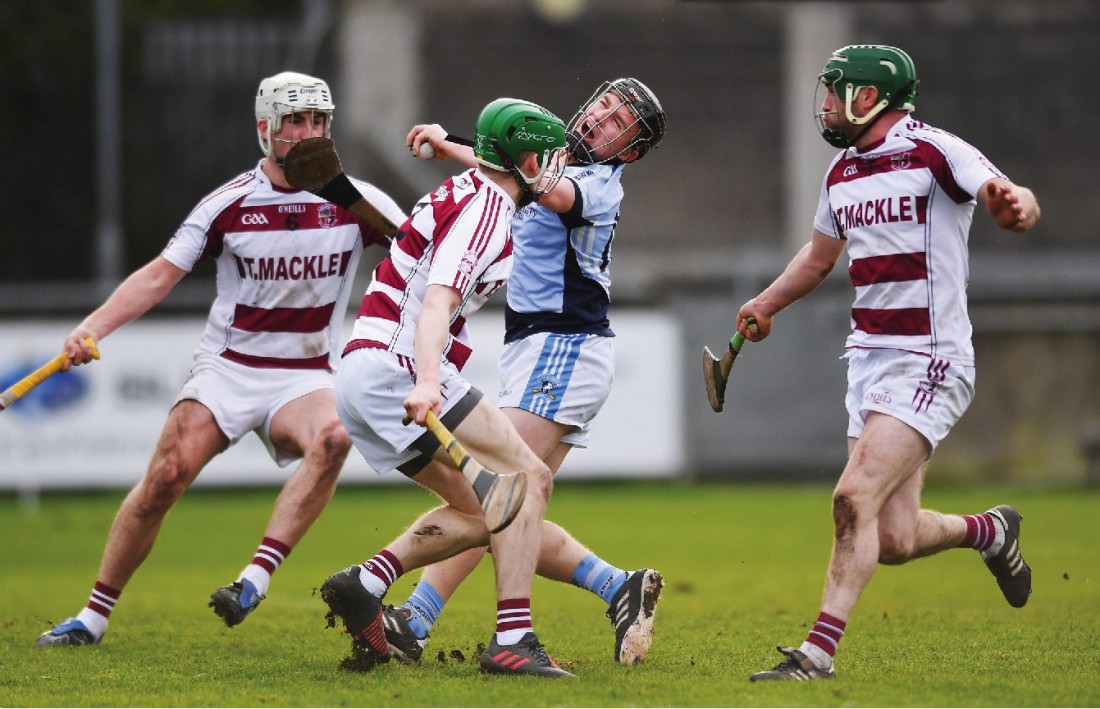In last week’s column I lauded the quality and entertainment value of the hurling championship in the province.
The Antrim semi-finals at the weekend didn’t disappoint and backed up the claim as a huge crowd in Ballycastle witnessed two equally enthralling games between St John’s and Cushendall in the first game – which ended up a draw – followed by Dunloy against Loughgiel. Dunloy came out on top by three points.
Both games were high in intensity, full of controversy and interspersed with moments of brilliant hurling.
They also proved, as if it needed proving, that championship hurling is a very different beast to playing league. The pace of the games, the ferocity of the tackling, the atmosphere and tension all go up several gears.
Antrim county board are to be commended for putting the games on as a double header and for keeping the admission fee to £10. In light of recent criticism of the price of All-Ireland tickets at least locally the GAA cannot stand accused of being the “Grab All Association”.
I also talked last week about the lack of clubs seriously competing for county titles in Ulster and highlighted the fact that Ulster hurling suffers a bit from the fact that football is the predominant game in the province making it hard for hurling to get the investment it needs to develop and grow.
All the more reason why dual clubs should be supported as much as possible in terms of fixture management. I say this coming from a dual club myself and having some understanding of the difficulties clubs face in striking a balance between participation in both codes and ensuring players are looked after in terms of the demands placed on them.
Unfortunately, such understanding and support was not demonstrated by the Antrim County board in their fixture scheduling for St John’s who took part in the first semi-final against holders Cushendall.
They had played a football championship quarter final the week before, a game which was also drawn and then were fixed with a replay on the Wednesday night, four days before the most important date in their hurling calendar.
That’s three season defining games in the space of one week. I do appreciate the pressure of fixtures and the conundrum of trying to accommodate everyone fairly, but I don’t see anything fair in what was asked of St John’s. From what I know they have lot of dual players who will have prepared diligently all year for hurling and football championships.
So to ask them to play such important games in such a short timeframe does little to promote the playing of both codes and flies in the face of player welfare.
Sports Science clearly evidences the need for rest and recuperation to enable players to compete at their best.
My point is that to promote and develop hurling and to increase the number of clubs competing at senior level we need dual clubs to flourish.
That won’t happen if hurling is viewed as a threat to football especially where clubs see football as their greatest chance of success.
In Antrim there are just two hurling-only clubs at Senior level, Loughgiel and Cushendall.
There is zero chance of either of these clubs introducing football, the very thought of it would lead to street demonstrations and a serious risk of public disturbance.
Brexit would be less controversial. In the same way many football only clubs wouldn’t countenance the introduction of hurling. They would reasonably argue they don’t have the knowledge, the manpower, the money or most important of all the desire.
All the more reason that in the absence of new teams coming forward we need to protect and nourish the dual club in whatever way we can in order to promote and grow the game of hurling.
This should mean flexibility around fixture management especially at the business end of the season when championship is at the knockout stage and there are no second chances. Teams need to be able to properly prepare and recover to give them a fair chance of success in both codes. At the end of the day clubs should never feel punished for promoting both games.
It is of course possible to be successful in both codes, Slaughtneil being the perfect example, however they are a bit of an exception and in Derry they only play something like six hurling league games a year so the demands during the year are not excessive.
The Antrim league has 13 games in hurling and 16 in football which can make it hard to get the balance right and sometimes calls for a pragmatic and common-sense approach to what is achievable and realistic from a fixture’s perspective.
I don’t envy fixture makers; it is a thankless job and impossible to keep everyone happy. However, when we look at development strategies for hurling the importance of the dual club cannot be ignored and placing excessive and unreasonable demands on these clubs and their players does not encourage the participation.
We desperately need to improve standards.
Receive quality journalism wherever you are, on any device. Keep up to date from the comfort of your own home with a digital subscription.
Any time | Any place | Anywhere












